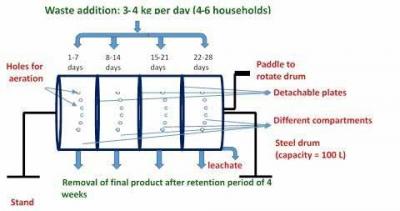
Municipal solid waste (MSW) is a major challenge worldwide especially in developing nations like India. Wet biodegradable waste contributes around 40-50% of total MSW generated in India. Composting is considered one of the most feasible options for the biodegradable fraction of MSW due to its operation in aerobic conditions, lesser possibility of odorous emissions and stable end-product which can be used as soil conditioner. However, the long composting period and product quality have been the major concerns. Hence, the aim of the project was to develop the community level composting systems converting waste into stable product in shorter duration. Fig.1: Modified composting bins for household wet waste processing
To accomplish the above goal, the initial runs were performed in batch mode in plastic bins (125 L capacity) with 80 kg household wet waste (Fig. 1).The provisions for passive air circulation were made by providing holes on the circumference of the bins. In addition, the influence of adding microbial inoculum on the composting process was also studied. Afterwards, the study was performed in continuous mode with 3-4 kg waste addition daily for a period of 15 days in 60 L capacity plastic bins. The final product was analysed to assess its quality as compost according to Solid Waste Management Rules (2016). Based on the findings of experimental study, it can be suggested that the active decomposition of household wet waste
could be completed within a month in the presence of microbial inoculum. At present, the trial runs are going on to treat household wet waste generated from a low rise building (four
apartments) at IIT Bombay campus. Besides, the trial runs in a new rotary compartmentalised composting drum (Fig. 2) are also in progress.
Prof. Anurag Garg
